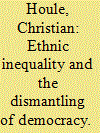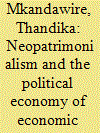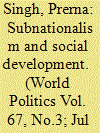|
|
|
Sort Order |
|
|
|
Items / Page
|
|
|
|
|
|
|
| Srl | Item |
| 1 |
ID:
139921


|
|
|
|
|
| Summary/Abstract |
Does inequality between ethnic groups destabilize democracies? While the literature largely agrees that inequality harms democracies, previous studies typically focus on the overall level of inequality in a society, leaving unanswered questions about the effect of inequality between ethnic groups. This article fills this gap and argues that inequality between ethnic groups harms the consolidation of democracy but that its effect is strongest when inequality within groups is low. Using group- and country-level data from more than seventy-one democracies and 241 ethnic groups worldwide, the author conducts the first cross-national test to date of the effect of ethnic inequality on transitions away from democracy. Results provide support for the hypothesis: when within-ethnic-group inequality (WGI) is low, between-ethnic-group inequality (BGI) harms democracy, but when WGI is high, BGI has no discernable effect.
|
|
|
|
|
|
|
|
|
|
|
|
|
|
|
|
| 2 |
ID:
139924


|
|
|
|
|
| Summary/Abstract |
During the past two decades, neopatrimonialism has become the convenient, all purpose, and ubiquitous moniker for African governance. The school of thought behind this research program, which the author refers to as the neopatrimonialism school, has produced an impressive literature on Africa. Its analysis informs policymakers and its language permeates media reportage on African states. While neopatrimonialism has long been a focus of development studies, in recent times it has assumed politically and economically exigent status. The school identifies causal links between neopatrimonialism and economic performance, and makes predictions drawing from what is referred to as the "logic of neopatrimonialism." Neopatrimonialism is said to account for trade policies, hyperinflation, economic stagnation, low investment in infrastructure, urban bias, andultimately, the lack of economic development in Africa. This article examines the empirical basis of predictions and policy prescriptions. It argues that while descriptive of the social practices of the states and individuals that occupy different positions within African societies, the concept of neopatrimonialism has little analytical content and no predictive value with respect to economic policy and performance.
|
|
|
|
|
|
|
|
|
|
|
|
|
|
|
|
| 3 |
ID:
139923


|
|
|
|
|
| Summary/Abstract |
The quality of life that a person leads depends critically on where it is led. Even taking into account levels of economic development, the chances of an individual surviving through infancy, growing up literate, or living a healthy, long life vary dramatically across regions of the world, in different countries, and within the same country. What are the causes of such variation in wellbeing? This article points to a factor that has been virtually ignored in the vast scholarship on social welfare and development—the solidarity that emerges from a sense of shared identity. The argument marks an important departure from the traditional emphasis on the role of class and electoral politics, as well as from the dominant view of the negative implications of identity for welfare. Combining statistical analyses of all Indian states and a comparative historical analysis of two Indian provinces, Kerala and Uttar Pradesh, this article demonstrates how the strength of attachment to the subnational political community—subnationalism—can drive a progressive social policy and improve developmental outcomes.
|
|
|
|
|
|
|
|
|
|
|
|
|
|
|
|
| 4 |
ID:
139919


|
|
|
|
|
| Summary/Abstract |
The authors study the influence of domestic political dissent and violence on incumbent dictators and their regimes. They argue that elite with an interest in preserving the regime hold dictators accountable when there is a significant increase in terrorism. To pinpoint the accountability of dictators to elite who are strongly invested in the current regime, the authors make a novel theoretical distinction between reshuffling coups that change the leader but leave the regime intact and regime-change coups that completely change the set of elites atop the regime. Using a new data set that distinguishes between these two coup types, the authors provide robust evidence that terrorism is a consistent predictor of reshuffling coups, whereas forms of dissent that require broader public participation and support, such as protests and insurgencies, are associated with regime-change coup attempts. This article is the first to show that incumbent dictators are held accountable for terrorist campaigns that occur on their watch.
|
|
|
|
|
|
|
|
|
|
|
|
|
|
|
|
| 5 |
ID:
139918


|
|
|
|
|
| Summary/Abstract |
This article proposes a political economy approach to decolonization. Focusing on the industrial organization of agriculture, it argues that competition between colonial and metropolitan producers creates demands for decolonization from within the metropole when colonies have broad export profiles and when export industries are controlled by colonial, as opposed to metropolitan, interests. The author applies this framework to the United States in the early 1900s, showing that different structures of the colonial sugar industries in the Philippines, Hawaii, and Puerto Rico–diverse exports with dispersed local ownership versus monocrop economies dominated by large US firms–explain why protectionist continental-agriculture interests agitated so effectively for independence for the Philippines, but not for Hawaii or Puerto Rico. A comparative historical analysis of the three colonial economies and the Philippine independence debates complemented by a statistical analysis of roll call votes in the Hare-Hawes-Cutting Act supports the argument. In providing a new perspective on economic relations in the late-colonial era, the argument highlights issues of trade and empire in US history that span the subfields of American political development, comparative politics, and international political economy.
|
|
|
|
|
|
|
|
|
|
|
|
|
|
|
|
|
|
|
|
|